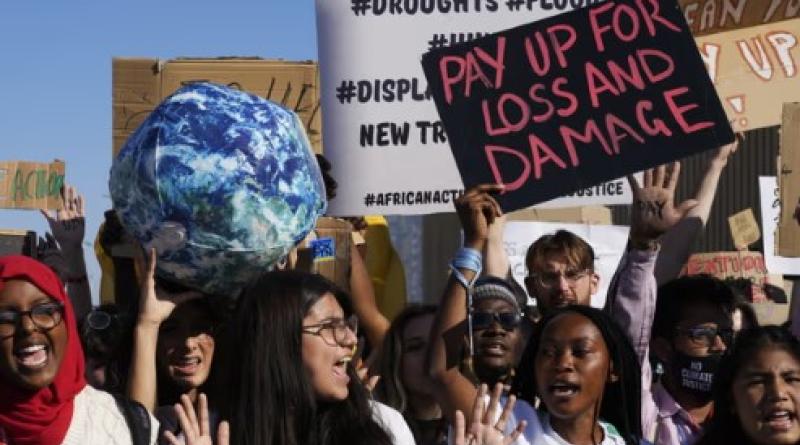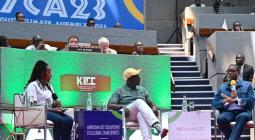Young people can help solve the climate crisis. Let’s give them a seat at the table

Success at Cop28 and in the future lies in equipping a new generation to lead the transition to a greener planet. Countries such as Kenya have already laid the groundwork
The faces of young climate activists have become familiar in reports of UN climate talks. Their frustration and anxiety are understandable. We are off-track in achieving global climate goals, and their generation faces a crisis it did not create.
But what often goes unnoticed in climate discussions is the proactive work of dynamic young people in low- and middle-income countries. From the Kenyan Youth Biodiversity Network engaging in national policy discussions to social entrepreneurs in the Philippines creating green business opportunities, young people are taking matters into their own hands by actively educating their communities and seeking green opportunities.
They need more from global leaders. The potential and power of young people – especially young women – is not fully recognised. They feel neglected in climate policy action, and weaknesses in education and training systems mean they lack the opportunity, skills and tools to enable them to participate in and drive the green economy of the future.
Tragically, more than two-thirds of all young people globally – some 800 million – do not have secondary-level literacy or numeracy skills, and an even greater number lack the necessary Stem, green or industry-specific skills to thrive in the green economy of the future.
While we talk a great deal about the need for financial investment, we don’t talk enough about the need for skilled people to implement those investments. While climate experts are closely monitoring shifts in global economic systems – such as energy, transport, industry and food – the human capital and skills needed to power these shifts remains largely overlooked in current economic transition modelling, making many projections unrealistic.
As a result, a growing mismatch is emerging. On one hand, we have reports of unprecedented increases in jobs from the transition to clean energy alone, and on the other we have stark warnings of unprecedented levels of youth unemployment, not seen in 15 years. Cop28 provides an opportunity for a response.
To create a world where “green skills” become a reality for young people, we propose four fundamental actions. In these, we should learn from progress in countries such as Kenya, which is already offering inspiration for equitably reducing youth unemployment and producing working models that can be replicated across the globe.
First, young people need information. We must improve local labour market data to track the fastest-growing green and blue sectors in line with national priorities, and make sure that this data is accessible to local policymakers, small enterprises, young jobseekers and the education and training providers that serve them.
Research at the US-based Education Development Center (EDC) has so far identified more than 270 different occupations in the fastest-growing green and blue sectors in renewable energy, green construction, waste management, tourism, sustainable agriculture and forestry. However, recent EDC surveys of local workforce development stakeholders across Africa and east Asia highlight varying levels of awareness of these opportunities among training providers, local government and young jobseekers.
Second, young people need flexible modular curriculums that can prepare them with the skills they need, including basic literacy and numeracy, climate education, green and digital skills, and industry-specific skills. And skills development strategies must become a central part of national climate mitigation and adaptation strategies. At present, fewer than 40% of nationally determined contributions include plans for skills, while virtually all include plans for money.
Kenya’s national Green Economy Strategy and Implementation Plan outlines a comprehensive strategy for transitioning to a green economy. This, in turn, informs education and training systems. Kenya aims to provide 18 million learners, including those with special needs, with opportunities to showcase their understanding, skills, and knowledge of the climate crisis, and critically, to offer possible solutions.
Creative learner-driven approaches, such as the First Lady Mazingira award, an annual environment and climate competition, are empowering learners with knowledge and skills to shift attitudes and behaviour changes and, more importantly, offering a chance to give input on the nation’s climate adaptation agenda.
Third, youth and female entrepreneurs need reliable financing. This is unfamiliar for many local financial institutions, and they may need subsidies, regulatory encouragement and special programmes.
The Joyful Women programme, a table banking-based financial inclusion model in Kenya, has played a leading role in uniting communities of women, encouraging them to combine resources and capitalise on green economy opportunities. Financial resources have been complemented by continuous training and mentorship in financial literacy, entrepreneurship, leadership skills and, crucially, green skills – such as training in the land restoration economy and even insect farming.
Finally, all young people need a seat at the table. The UN Committee on the Rights of the Child stated this year that young people have a right to be heard and included in climate decisions. And yet the knowledge, potential and power of young people are too often kept on the sidelines.
Youth-led and youth-serving organisations are bringing energy and inclusion, prioritising populations most impacted by the climate crisis. Kenya’s globally famous tree-planting and landscape-restoration movement, including its famed Green Belt programme, has involved young people since the beginning.
As global leaders gather to discuss the path to net zero, we must recognise that young people, with the most to gain but also the most to lose, will inherit the results of our climate decisions – at Cop28 and beyond. Let’s centre their voices in our dialogues and make investment in their education and skills a priority.
Rachel Ruto is the first lady of Kenya. Dr Liesbet Steer is president and CEO of the Education Development Center





